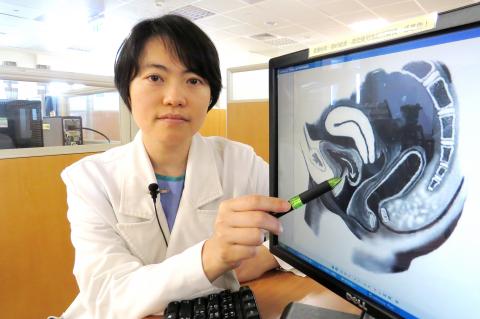A little over five years ago a 52-year-old woman surnamed Chen started suffering from urinary incontinence, silently enduring it until her bladder became prolapsed. A hunk of tissue was stuck at her vagina’s vulva. When the situation worsened it got so bad that the tissue was as big as a chicken egg. Chen thought that walking and exercising would improve the condition, but it only made things worse, which was when she decided to have surgery and undergo therapy. “Since I had surgery I no longer have that sensation like something is stuck down there, and I urinate pretty good now,” Chen says.
Older women typically have problems with involuntary urination, which they rarely talk about. Chen would experience incontinence when she used stairs or sneezed, and when she would get the urge to urinate it would be too late by the time she got to the toilet, so she eventually stopped going out altogether. She also had to use sanitary pads if she absolutely had to leave the house.
Eventually Chen’s bladder protruded through the vaginal opening. In recent years, regardless of whether she was standing or walking, Chen would feel stabbing pains and discomfort. Her family and friends advised her that walking and exercising would help, so she started walking for an hour every day. Her prolapsed bladder ended up getting worse, which gave her the courage to finally have surgery.

Photo: Hsieh Fong-chiu, Liberty Times
照片:自由時報記者謝鳳秋
Liu Hsin-ho, a doctor in the urology department at Taichung Tzu Chi Hospital, says that stress incontinence usually occurs in older women, during menopause or after childbirth because the pelvic muscles and fascia become too weak to support the bladder. The more advanced a woman is in years the worse the situation is. Most patients at clinics are over the age of 70. Women who have natural, multiple or long childbirths, or regularly stand for a long time or do heavy lifting on the job are more likely to suffer from a prolapsing bladder, Liu says. It is atypical for someone like Chen in their 40s to experience this condition, Liu says.
Liu says that doing pelvic floor exercises like the Kegel exercise is the best way to prevent oneself from developing a prolapsing bladder. Persevering and doing the exercises as early as possible in life will get the best results, Liu says, adding that the degree of prolapse is greater the worse the condition is, which makes it more difficult for surgery to work.
(Liberty Times, Translated by Kyle Jeffcoat)
五十二歲陳女士五年多前就尿失禁,隱忍拖到膀胱脫垂,一團肉卡在陰道口,甚至惡化到像雞蛋那麼大,以為走路運動可改善,卻愈來愈糟才手術治療,她說:「術後終於沒有感覺卡卡的,排尿也不錯。」
女性長輩常有尿失禁難言之隱,像陳女士上下樓梯、打噴嚏就會漏尿,一有尿意即去廁所還是來不及,因此幾乎足不出戶,非得出門則需用護墊。
後來還出現膀胱脫垂卡陰道口,近年不管站還是走,總感覺刺痛、不舒服,親友勸她走路運動改善,天天走一小時,脫垂反而更嚴重,才鼓起勇氣接受手術。
台中慈濟醫院泌尿科醫師劉昕和指出,婦女「應力性尿失禁」好發跟年紀大、停經及生產造成的骨盆底肌肉及筋膜力量不夠有關,年紀愈大愈嚴重,門診常見患者多為超過七十歲,自然產、多產或產程過長婦女、長期久站、工作需拿重物者,也是好發族群,但像陳女士四十多歲就發病不多見。
劉昕和說,預防之道是做凱格爾運動這類的提肛運動,持之以恆,愈早做愈有效果,脫垂愈嚴重懸吊範圍愈大,手術愈不好做。
(自由時報記者謝鳳秋)

In an effort to fight phone scams, British mobile phone company O2 has introduced Daisy, an AI designed to engage phone con artists in time-wasting conversations. Daisy is portrayed as a kindly British granny, exploiting scammers’ tendency to target the elderly. Her voice, based on a real grandmother’s for authenticity, adds to her credibility in the role. “O2” has distributed several dedicated phone numbers online to direct scammers to Daisy instead of actual customers. When Daisy receives a call, she translates the scammers’ spoken words into text and then responds to them accordingly through a text-to-speech system. Remarkably, Daisy

Bilingual Story is a fictionalized account. 雙語故事部分內容純屬虛構。 Emma had reviewed 41 resumes that morning. While the ATS screened out 288 unqualified, she screened for AI slop. She could spot it a mile away. She muttered AI buzzwords like curses under her breath. “Team player.” “Results-driven.” “Stakeholder alignment.” “Leveraging core competencies.” Each resume reeked of AI modeling: a cemetery of cliches, tombstones of personality. AI wasn’t just changing hiring. It was draining the humanity from it. Then she found it: a plain PDF cover letter. No template. No design flourishes. The first line read: “I once tried to automate my

Every May 1, Hawaii comes alive with Lei Day, a festival celebrating the rich culture and spirit of the islands. Initiated in 1927 by the poet Don Blanding, Lei Day began as a tribute to the Hawaiian custom of making and wearing leis. The idea was quickly adopted and officially recognized as a holiday in 1929, and leis have since become a symbol of local pride and cultural preservation. In Hawaiian culture, leis are more than decorative garlands made from flowers, shells or feathers. For Hawaiians, giving a lei is as natural as saying “aloha.” It shows love and

1. 他走出門,左右看一下,就過了馬路。 ˇ He walked outside, looked left and right, and crossed the road. χ He walked outside and looked left and right, crossed the road. 註︰並列連接詞 and 在這句中連接三個述語。一般的結構是 x, y, and z。x and y and z 是加強語氣的結構,x and y, z 則不可以。 2. 他們知道自己的弱點以及如何趕上其他競爭者。 ˇ They saw where their weak points lay and how they could catch up with the other competitors. χ They saw where their weak points lay and how to catch up with the other competitors. 註:and 一般連接同等成分,結構相等的單詞、片語或子句。誤句中 and 的前面是子句,後面是不定詞片語,不能用 and 連接,必須把不定詞片語改為子句,and 前後的結構才相等。 3. 她坐上計程車,直接到機場。 ˇ She took a cab, which took her straight to the airport. ˇ She took a cab and it took her straight